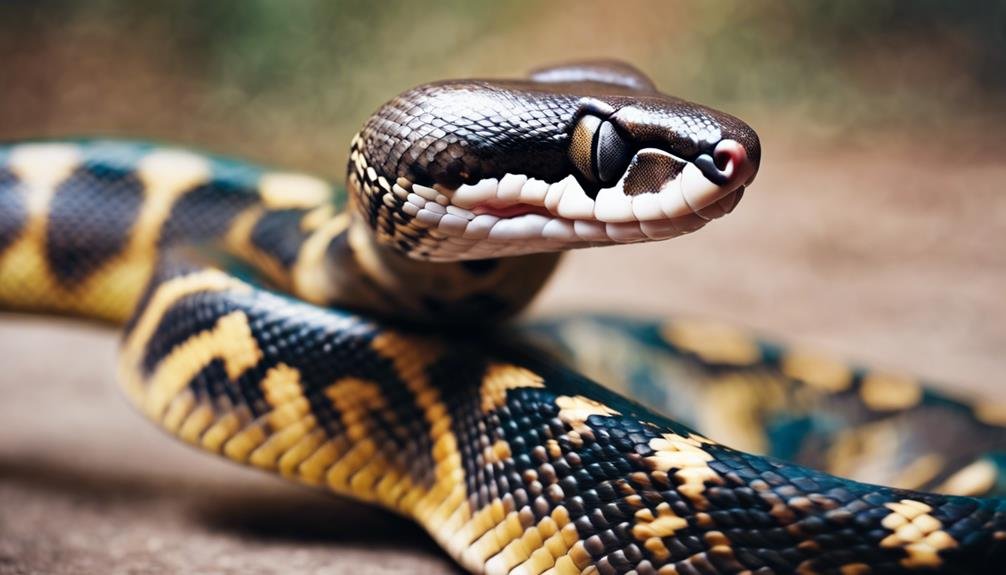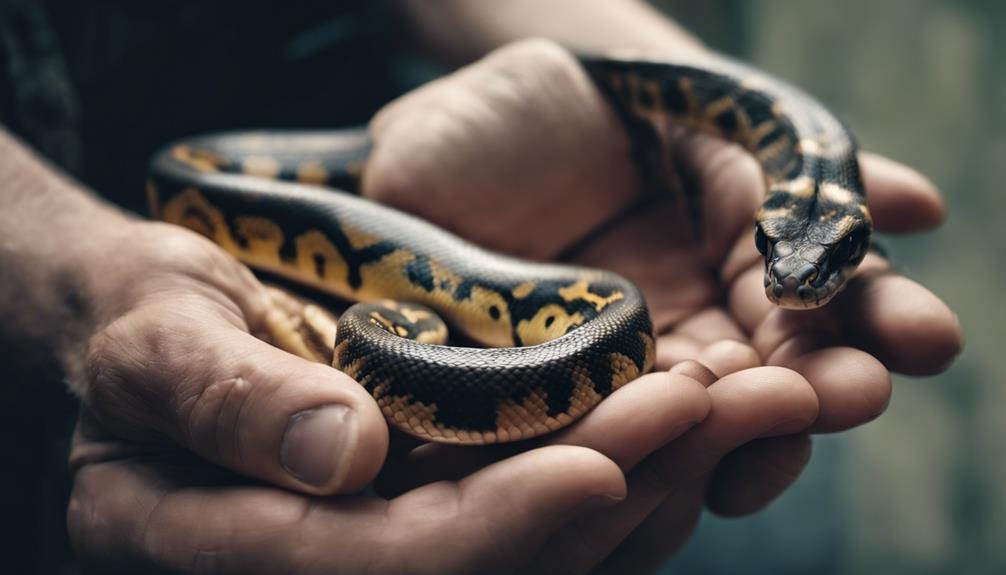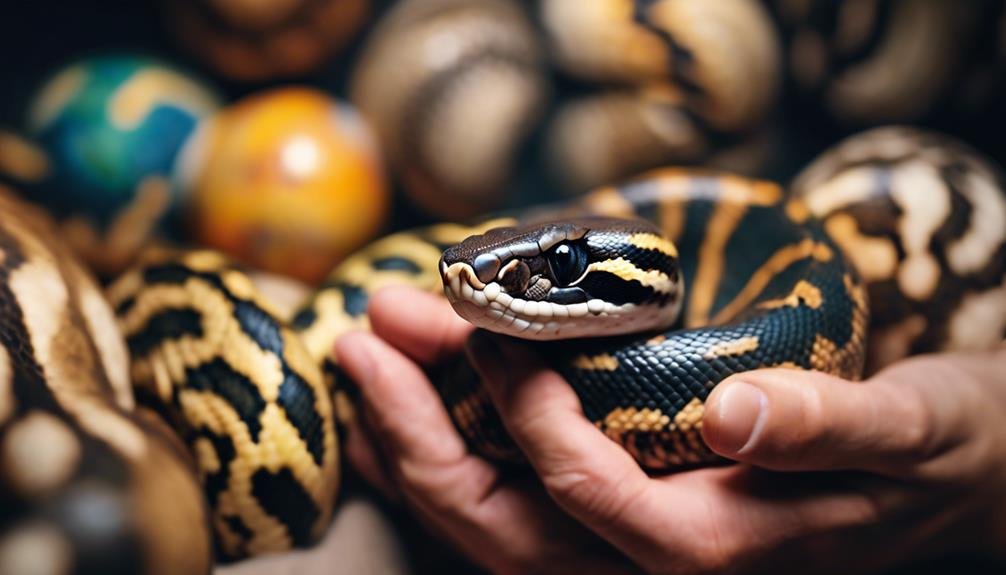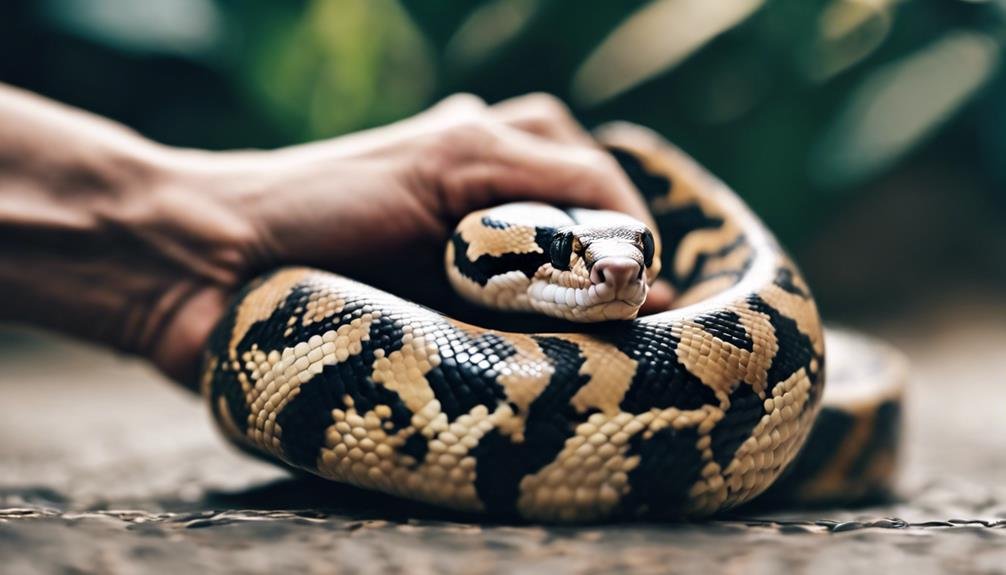You’ve probably heard mixed opinions on whether ball pythons are dangerous, sparking curiosity and perhaps a bit of concern. It’s essential to understand that while these creatures aren’t inherently aggressive, they can display defensive behaviors if they feel threatened or are not handled correctly. Their capability to bite, albeit rarely harmful to humans, underscores the significance of proper care and handling techniques. But what exactly triggers these behaviors, and how can you guarantee both your safety and the well-being of your pet? Let’s explore the nuances of ball python behavior, debunk common myths, and uncover the facts that will equip you with the knowledge to foster a harmonious relationship with these fascinating reptiles.
Key Takeaways
- Ball pythons are known for their docile and non-aggressive nature towards humans.
- They can bite if threatened or stressed, but such incidents are rare and usually non-serious.
- Their bites are less dangerous than those of venomous snakes, primarily causing minor scratches or teeth marks.
- Proper handling and understanding of their behavior significantly minimize the risk of bites.
- Stress and discomfort in ball pythons can be managed through gentle care and a secure habitat, further reducing any potential danger.
Understanding Ball Pythons
While ball pythons are native to Sub-Saharan Africa, it’s their mild-mannered and non-aggressive behavior that makes them popular pets worldwide. You’re likely drawn to these fascinating creatures for their unique features, such as heat-sensing pits that allow them to detect warm-blooded prey in the dark, and a specialized quadrate bone enabling them to swallow prey much larger than their head. As a nocturnal hunter, a ball python prefers a diet of rodents, shrews, and small mammals, which they constrict to subdue.
Owning a ball python means committing to their specialized care needs, including setting up an appropriate enclosure, maintaining proper humidity levels, and providing a diet that mimics their natural hunting habits. These aspects are essential for their well-being and to prevent any need for immediate medical attention due to care issues. With a potential lifespan of up to 20 years, ball pythons can be long-term companions for responsible and committed pet owners. Their relatively low maintenance, combined with their docile nature, ensures they aren’t dangerous to humans, making them an excellent choice for a pet snake.
Ball Python Behavior
You might wonder what makes ball pythons such popular pets despite being reptiles. It’s their typically submissive temperament and the specific ways you should handle them that set them apart.
Typical Temperament Traits
Ball pythons are known for their docile and submissive nature, making them ideal pets for both beginner and experienced reptile enthusiasts. As nonvenomous snakes, they’re not aggressive towards humans. Instead of attacking, they’re more likely to retreat or hide when feeling threatened.
On the rare occasion they feel stressed or scared, they may display defensive behaviors like hissing or coiling. However, with proper socialization, these instances can become infrequent. Learning to understand their behavior cues, such as body language and feeding responses, is essential. It not only helps in reducing their stress but also in strengthening the bond between you and your ball python, ensuring a harmonious relationship built on trust and mutual respect.
Common Handling Techniques
Understanding your ball python’s temperament is the first step; next, let’s explore how to handle them safely and comfortably.
If your ball python feels threatened or stressed, they may strike or resort to python bites. To prevent this, make sure you’re supporting their body properly, making them feel secure. Avoid sudden movements or loud noises, as these can stress your snake. Instead, use slow and gentle movements to build trust during your handling sessions.
It’s important to read your snake’s body language to gauge their comfort level. If they seem agitated or scared, it’s best to give them some space. Proper handling techniques not only minimize the risk of python bites but also strengthen the bond between you and your pet.
Potential for Bites


Although generally calm, ball pythons can bite if they feel threatened or stressed. These typically docile creatures may display a rare aggressive side under certain conditions. It’s especially true for younger snakes, which might feel more vulnerable and resort to biting as a defense mechanism. Bites, while not common, can result in curved teeth marks, scratches, puncture wounds, and even bruising, given their inward-curved teeth.
Defensive bites are often a ball python’s way of signaling discomfort or fear. Unlike aggressive attacks aimed to harm, these warning bites serve as a plea for space and peace. You might find yourself on the receiving end during routine handling, particularly if your snake is in the midst of shedding or if it mistakes your hand for food. Remember, these incidents stem from the snake’s natural instincts and not from a place of malice.
It’s important to note that ball pythons don’t have fangs. Instead, their bites, though startling, are less dangerous than those of venomous snakes. However, any bite from a pet, including a ball python, warrants proper cleaning and care to prevent infection and guarantee both your safety and that of your slithery friend.
Signs of Stress in Ball Pythons
Recognizing the signs of stress in your ball python is vital to guaranteeing its well-being and health. Stress in ball pythons can manifest through various behaviors that indicate they’re not feeling their best. If you notice your snake hissing, striking out, or constantly hiding, it’s time to take a closer look at their environment and care routine. These behaviors are clear indicators that something’s off.
Other signs of stress to watch for include a decreased appetite, which could signal your ball python isn’t comfortable or happy. Excessive shedding and frequent pacing are also red flags that shouldn’t be ignored. It’s important to understand that stress can stem from several factors, such as environmental changes, improper handling, or even a lack of proper hiding spots within their enclosure.
Paying attention to your ball python’s body language can offer insights into their stress levels. A tense posture or defensive coiling are tell-tale signs that they’re feeling threatened or uneasy. To mitigate stress, make sure their habitat is secure and enriched with adequate hiding spots. Consistent, gentle care will also go a long way in keeping your ball python relaxed and healthy.
Handling and Safety Tips


After ensuring your ball python’s stress levels are managed, it’s equally important to know how to safely handle and care for them to prevent any potential dangers. Educating yourself on proper handling techniques is a cornerstone of snake ownership. Gentle, confident handling can greatly reduce the risk of defensive behavior and potential bites. Make sure to socialize your ball python regularly, allowing it to become accustomed to human interaction.
Maintaining a clean and sanitized enclosure isn’t just about aesthetics; it’s essential for the health and safety of both your snake and your family. Regular cleaning prevents the build-up of harmful bacteria and parasites, ensuring a safe environment for everyone.
Supervising any interactions between your ball python and young children is crucial. Kids may not understand the importance of gentle handling, and unsupervised encounters can lead to accidents or injuries.
Lastly, always be attentive to your ball python’s health. If you notice signs of illness or distress, promptly seeking veterinary care is important. Taking these steps ensures that handling your ball python is a safe, enjoyable experience for both you and your pet.
Health Risks From Bites
You might wonder about the risks tied to ball python bites beyond the immediate pain. There’s a chance you could face infection risks, have allergic reactions, or even experience a psychological impact after a bite.
It’s important to understand these potential outcomes to make sure you’re fully prepared in handling these creatures.
Bite Infection Risks
While ball python bites aren’t typically deadly, they do carry a risk of infection, including bacterial infections like salmonella, making them a concern for owners. These bites can be painful, traumatic, and potentially expensive to treat due to infection risks.
If you own a ball python, especially one that’s aggressive or easily frightened, you should be extra cautious about these potential health risks. It’s critical to practice proper hygiene to reduce the transmission of bacteria and prevent infection from bites. Always wash your hands thoroughly after handling your snake or cleaning its habitat.
If you’re ever bitten, seeking prompt medical attention is crucial to address potential health complications and make sure the bite doesn’t lead to serious infection.
Allergic Reactions
Did you know that some individuals might experience allergic reactions to ball python bites, including symptoms like redness, swelling, and itching at the bite site? Allergic reactions, while not universally experienced, can vary from mild to severe and should never be taken lightly.
If you’re bitten and notice any of these symptoms, it’s important to seek medical attention promptly. The severity of allergic responses to snake bites can differ greatly among individuals, so even if you’ve been bitten before without issue, you can’t predict how your body will react each time.
Healthcare professionals are equipped to manage these reactions effectively. Remember, while ball pythons are generally not aggressive, it’s vital to handle them with care and be aware of the potential for allergic reactions.
Psychological Impact
Experiencing a ball python bite can leave lasting psychological effects, including anxiety and fear around snakes. While these creatures are not inherently aggressive, their bites, with around 150 teeth, can be quite painful and traumatic, potentially leading to a significant important impact.
| Immediate Actions After a Bite | Psychological Impact |
|---|---|
| Return the snake to its habitat | Increased anxiety |
| Seek medical attention | Fear of snakes |
| Avoid a tourniquet | Traumatic stress |
| Do not apply ice or water | Fear of future bites |
These experiences might not just affect your physical health but can deeply impact your mental well-being, leading to heightened fear or stress around not just ball pythons but all snakes. Recognizing and addressing these psychological effects is important for recovery.
Myths Vs. Facts
Unraveling the myths versus facts about ball pythons can clarify their true nature and safety as pets. You’ve probably heard quite a few stories about ball pythons, ranging from the slightly exaggerated to the wildly inaccurate. Here’s what you need to know:
- Bites are Rarely Serious: Yes, ball pythons can bite, but their bites aren’t life-threatening. They’re more startling than harmful. It’s important to understand that stress and fear are the primary triggers for such defensive behaviors in ball pythons. With proper handling, the risk of being bitten is minimal.
- Salmonella Risks are Manageable: Like many pet reptiles, ball pythons can carry salmonella. However, proper hygiene practices, such as washing your hands after handling your pet, can greatly reduce the risk of infection.
- Misconceptions Abound: Many of the fears surrounding ball pythons are based on myths. They’re often perceived as dangerous due to their constrictor nature, but in reality, they’re quite docile and make for gentle pets.
Are Ball Pythons Dangerous Because of Their Constricting Hunting Mechanisms?
Ball python hunting mechanisms are not dangerous to humans. These snakes use constriction to subdue prey, but they are not aggressive towards people. With their gentle demeanor and nonvenomous nature, ball pythons make great pets for reptile enthusiasts. Proper handling and care can ensure a safe and enjoyable experience.
Choosing a Ball Python


Selecting the right ball python requires careful consideration of several key factors, including size, temperament, and health. Ball python size is an important aspect to keep in mind, as it directly impacts your ability to properly house and care for your pet. You’ll want to make sure you’re prepared for the full-grown size of your python, which can greatly impact the space and type of enclosure you’ll need.
When choosing a ball python, it’s important to look for signs of good health. Clear eyes, smooth scales, and alert behavior are all good indicators that the python is healthy and well-cared for. These physical signs are your first clue to avoiding potential health issues down the road.
Opting for a captive-bred ball python is advisable, as they tend to be more docile and adaptable to life as a pet. They’re generally more accustomed to human interaction, making them a better option for those who are new to keeping reptiles.
Before making your final decision, thoroughly research and understand the specific care requirements, feeding habits, and potential lifespan of ball pythons. Assess your experience level with reptiles and your commitment to providing proper care to make sure you’re making the best choice for both you and your future pet.
Caring for Your Ball Python
Providing your ball python with the appropriate living conditions is crucial for its health and happiness. When you’re caring for your ball python, remember that their enclosure plays a significant role in their overall well-being. It should be spacious enough for them to move freely, have proper ventilation, and it’s best to keep them solitary to prevent any stress or aggression.
Creating a suitable environment involves more than just space. You need to make sure the temperature and humidity levels are just right. Ball pythons thrive in a warm environment with a gradient, allowing them to regulate their body temperature by moving around their enclosure. The humidity should mimic their natural habitat to help with shedding and overall health.
Here are three key aspects to focus on when caring for your ball python:
- Proper Diet: Feed them a balanced diet suitable for their age and size.
- Routine Health Checks: Regularly monitor their health and behavior and schedule vet check-ups.
- Education on Health Issues: Know the signs of common health problems to catch them early.
Conclusion
To wrap up, ball pythons aren’t inherently dangerous, but like any pet, they require understanding and proper care. By recognizing signs of stress, handling them safely, and debunking common myths, you can guarantee a harmonious relationship. Remember, their bites pose minimal health risks if treated correctly.
Choosing and caring for a ball python responsibly will make your experience rewarding. Embrace the journey of learning about these fascinating creatures and enjoy the unique companionship they offer.


